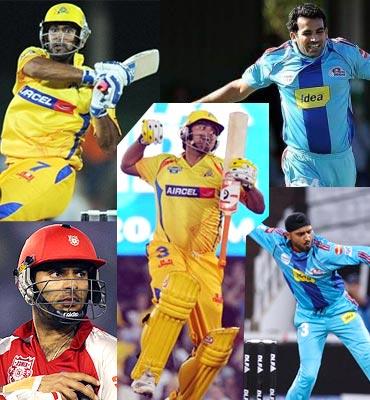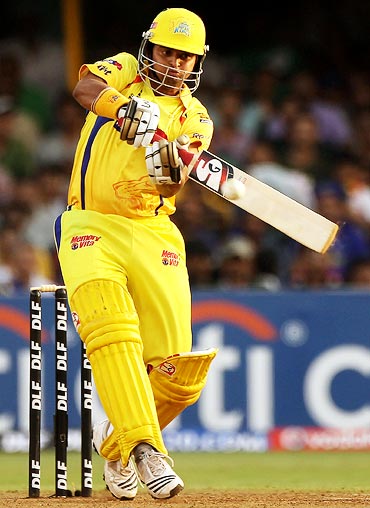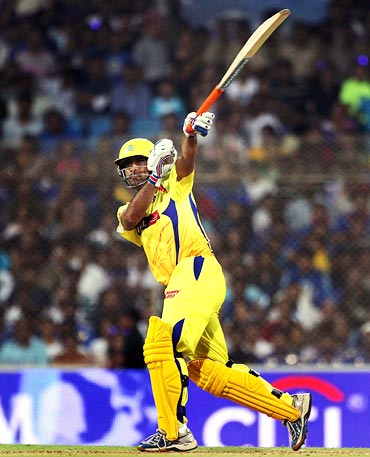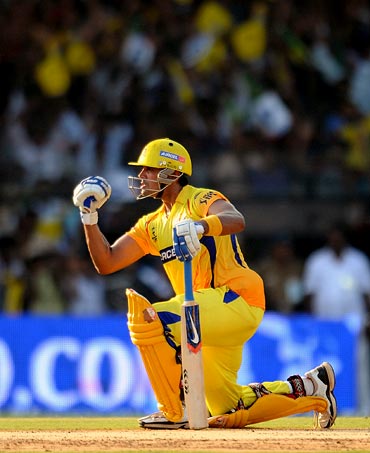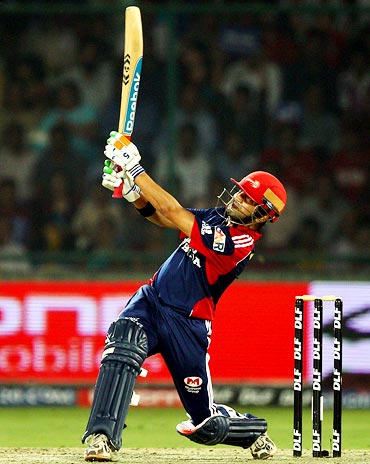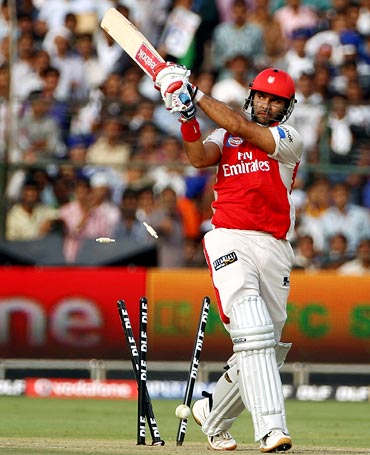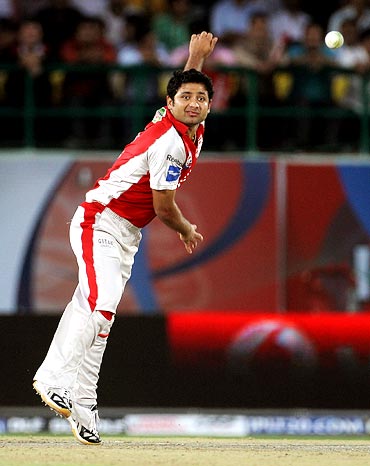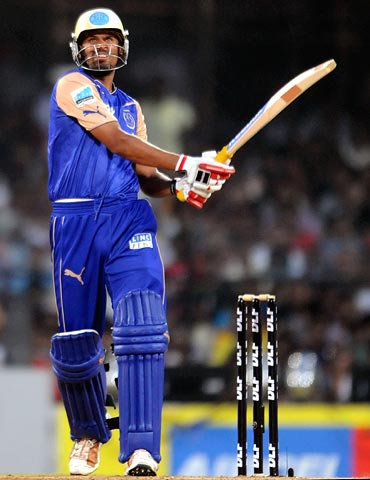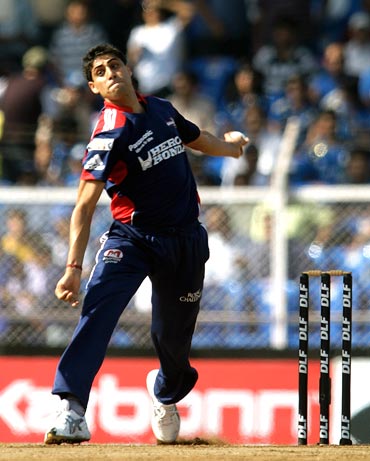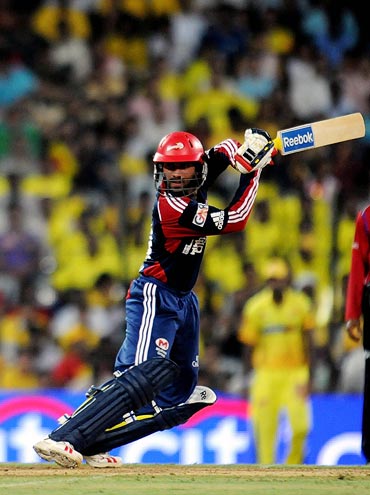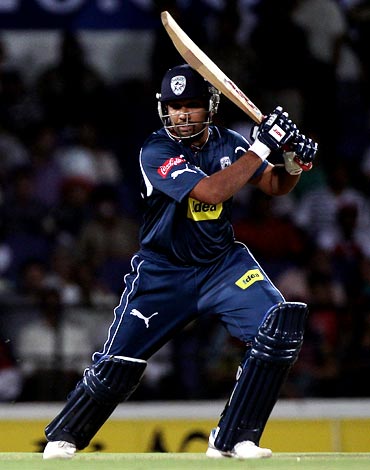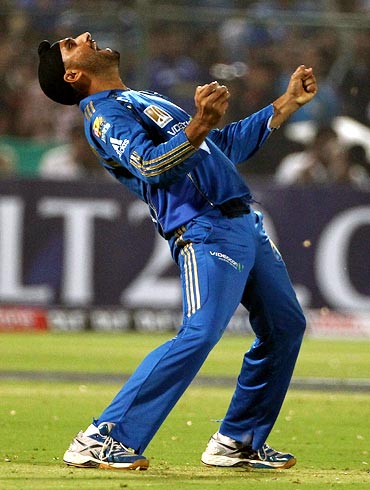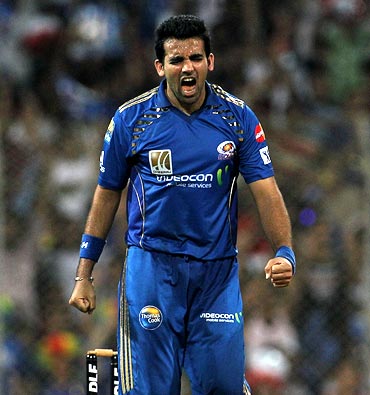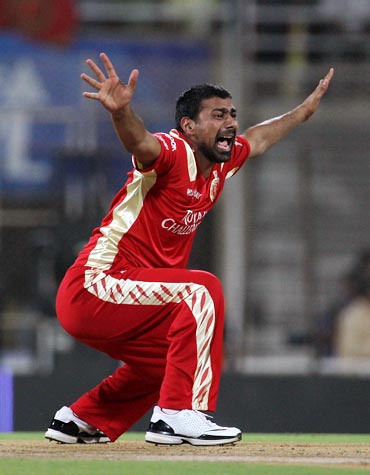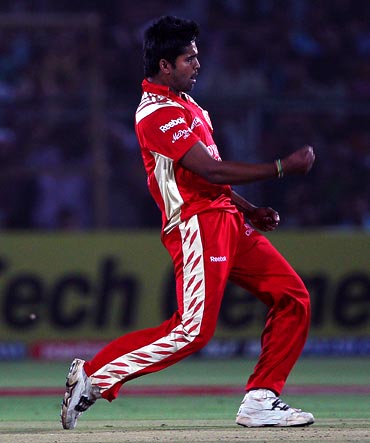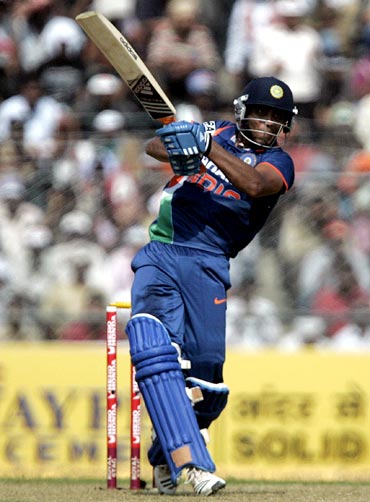 | « Back to article | Print this article |
Stern test awaits India at World T20
A stern test awaits a tired and jaded Team India in the World Twenty20, beginning in the West Indies on Friday, April 30.
All the players in the 15-member squad were busy playing in the Indian Premier League that concluded on Sunday, and after a long flight and a couple of days' wait they get back to business.
As the Indians opted for rest instead of warm-up games -- which was not surprising -- they will not have the opportunity to acclimatize to the conditions.
Mahendra Singh Dhoni and his boys stunned everyone by winning the inaugural edition of the Twenty20 World Cup in 2007. But they disappointed everyone in equal measure with an inconsistent performance in the following World Cup last year, failing to make it to the semi-finals.
This season the tournament will be played in the West Indies and Dhoni is confident the team can go all the way. His confidence stems from the good showing of some of his team members in the just-concluded IPL.
A look at how Team India's players fared in IPL-3:
Text: Harish Kotian
Photographs: IPL/Getty Images
Raina deserved best player award in IPL
Suresh Raina (Chennai Super Kings)
(520 runs in 16 matches @47.27 with 4 four half-centuries)
(6 wickets in 16 matches @ 29.66, Econ: 7.46)
Sachin Tendulkar was named player of the series, but, after his superb showing in the final, it was Suresh Raina who deserved the award.
If Chennai Super Kings defied all odds to win the Indian Premier League after an indifferent start, it was largely thanks to Raina's splendid and consistent showing with the bat.
The left-hander enhanced his reputation as one of the most dangerous batsmen in the shortest format of the game with quite a few blazing knocks in the tournament. He amassed 520 runs in 16 matches at an average of 47.27, joining Sachin Tendulkar (618 runs) and Jacques Kallis as the only players to cross the 500-run mark in the tournament.
Most importantly, it was his half-century that paved the way for Chennai's victory in the final. Mumbai Indians, who dropped him twice in the final, were made to pay big time as the left-hander went on to play a match-winning innings of 57 from 35 balls, which was instrumental in Chennai clinching their maiden IPL title.
The 23-year-old was the most consistent player in all the three editions of the IPL. He is the highest scorer with 1375 runs in 46 matches, with an average of 38.19 and a strike rate of 142.19, having hit nine half-centuries.
Such was Raina's impact in IPL-3 that he even made up for Matthew Hayden's poor run in the tournament. Now, India will be hoping he can do the same in the Twenty20 World Cup with most of the top batsmen looking out of touch.
Dhoni took Chennai into the final
Mahendra Singh Dhoni (Chennai Super Kings)
(287 runs in 13 matches @ 31.88 with 2 half-centuries)
Mahendra Singh Dhoni may have not done much in the tournament, but he played one of the most important knocks of the IPL.
If Chennai Super Kings made it to the final, it was only due to one man -- their captain.
With his team needing 29 from the last two overs against Kings XI Punjab in their final league game, Dhoni was the man for the moment. He launched a barrage of sixes to take Chennai home with two deliveries to spare and make it to the semi-finals for the third year in a row.
He did not have the best of starts to the tournament, forced to miss a few matches because of injuries in the first half of the tournament after being hit on the arm while batting.
But once he regained his rhythm, he was difficult to contain and made important contributions batting lower down the order.
Dhoni's captaincy skills also came to the fore, especially in the final against Mumbai Indians when he tactically outplayed Sachin Tendulkar.
IPL-3 saw the transformation of Murali Vijay
Murali Vijay (Chennai Super Kings)
(458 runs in 15 matches @ 35.23 with 1 century and 2 half-centuries)
IPL-3 saw the transformation of Murali Vijay. It was not long back that he was being branded as a Test specialist. But he made everyone eat their words with a scorching century against Rajasthan Royals.
It was an exhibition in power hitting, as Vijay smashed a 56-ball 127, laced with 11 sixes and eight boundaries.
He had another blazing knock -- 78 from 39 balls -- against Royal Challengers Bangalore, during which he even overshadowed the rampaging Suresh Raina to set up Chennai's victory.
The important feature of Vijay's batting in the IPL was that he proved that one does not have to heave across the line or play ugly shots to score runs quickly in Twenty20.
Thus, it wasn't a surprise when he was called up to the Indian team to replace the injured Virender Sehwag for the World Twenty20, where he will open the innings with Gautam Gambhir.
Burden of captaincy affected Gambhir's batting
Gautam Gambhir (Delhi Daredevils)
(277 runs in 11 matches @ 30.77 with 2 half-centuries)
The burden of captaincy was too much to handle for Gautam Gambhir.
The left-hander was in the form of his life in all forms of cricket for the last few years, but he seemed to have lost his golden touch in this IPL.
It was one of the most inconsistent displays by Gambhir in recent times; he scored just two half-centuries in 11 matches. His captaincy was also unimpressive, as he lost his cool quite a few times.
Not only did he slam his team mates during the tournament, but also dismissed his opponents once by calling Rajasthan Royals "an ordinary side".
His team selection was also in question after the world's top spinner Daniel Vettori was kept out of the last few matches on pitches offering a lot to the spinners and Delhi facing a must-win situation.
With Sehwag ruled out, Gambhir faces the extra responsibility of getting the team off to a good start at the World Twenty20.
Yuvraj was the biggest failure in IPL-3
Yuvraj Singh (Kings XI Punjab)
(255 runs in 14 matches @ 21.25)
Yuvraj Singh was the biggest failure in this year's IPL and the biggest reason for Kings XI Punjab's disappointing show in the tournament.
One of the most destructive batsmen in the world in the shorter version of the game, Yuvraj failed miserably. The most disappointing aspect was that he gave his wicket away with tame shots in most matches.
The left-hander was the least interested in proceedings and it seemed he was unhappy after being relieved of captaincy this season so that he could concentrate more on his batting.
That he did not score a single half-century in 14 matches proves that he going through the worst batting phase of his career. His wrist also doesn't seem to have recovered fully and most of the time he patrolled the boundary, not wanting to risk his wrist or his brittle knees.
With India not playing any warm-up matches ahead of the World Twenty20, Yuvraj will enter the tournament lacking in confidence.
Chawla looked ordinary and short of ideas
Piyush Chawla (Kings XI Punjab)
(12 wickets in 14 matches @ 30.58, Econ: 7.48)
Piyush Chawla's inclusion in the India's Twenty20 was ouWorld Cup squad still continues to be a mystery.
He had an average outing in the IPL, claiming 12 wickets, while playing on spin-friendly pitches most of the time. But the real worry is that he conceded runs at nearly 7.5 runs per over despite coming on to bowl mostly in the middle overs.
Chawla extracted good turn and also foxed quite a few batsmen with his googly, but once the batsmen got used to his bag of tricks, he looked ordinary and short of ideas.
Pragyan Ojha (20 wickets in 14 games) and Amit Mishra (17 wickets in 14 matches) were ignored despite being the top two wicket-takers in IPL-3. Interestingly, even veteran Anil Kumble took more wickets than Chawla, which says a lot about his ability.
Being the lone specialist spinner in the side, Chawla will have to shoulder a lot of responsibility in the West Indies and one is not sure if he will be able to handle the pressure.
Yusuf's consistency is still a big question mark
Yusuf Pathan (Rajasthan Royals)
(333 runs in 14 matches @ 27.75 with 1 century, 1 half-century)
(5 wickets @ 49.20, Econ: 7.23)
There is only so much that Yusuf Pathan can do; even Rajasthan Royals realised it this season.
He emerged the highest run-scorer for Rajasthan in the IPL with a tally of 333 runs and also claimed five wickets. But the others around him were found wanting on many occasions as a result of which 2008 champions Rajasthan failed to make it to the semi-finals.
Yusuf provided one of the most memorable moments of the IPL when he slammed a 37-ball century against Mumbai Indians, yet Rajasthan went to lose by four runs after being set 213 for victory.
Only Robin Uthappa outdid Yusuf in the list of most sixes in the tournament.
Yusuf's consistency though is still a big question mark. He is also yet to prove his worth in the international arena much to the frustration of his captain and the selectors.
Nehra made a good comeback
Ashish Nehra (Delhi Daredevils)
(6 wickets in 4 matches @ 16.00, Econ: 6.85)
Ashish Nehra gave a good account of himself in the last few matches of the IPL after making a comeback from a rib injury.
He played just four matches during which he bowled a magnificent spell of three for 26 to set up Daredevils' six-wicket victory against Chennai Super Kings.
Nehra was good with the new ball and in the death overs with the old ball; he not only managed to dry up the runs but also claimed vital wickets.
His experience should prove to be a big plus for India on the slow and low pitches the team will encounter in the West Indies.
Karthik failed to impress
Dinesh Karthik (Delhi Daredevils)
(278 runs in 14 matches @ 21.38 with 1 half-century)
If he is included in the eleven, he will have to play as a specialist batsman, since it is hard to take the gloves off captain Mahendra Singh Dhoni.
He doubled as wicketkeeper-cum-lower order batsman for Delhi Daredevils and had a very inconsistent tournament overall.
Karthik showed his attacking prowess when he slammed 69 from 38 balls to help Delhi Daredevils crush Rajasthan Royals by 67 runs. But when it really mattered for Delhi in the last few matches, he failed to make sizeable contributions with the bat.
Karthik will have to wait for his chances in the World Twenty20 as he faces stiff competition for a place in the middle order which has the likes of Rohit Sharma and Suresh Raina.
Rohit failed when it really mattered
Rohit Sharma (Deccan Chargers)
(404 runs in 16 matches @ 28.85 with 3 half-centuries)
Rohit Sharma was once again Deccan's mainstay with the bat. The defending champions overcame a slow start to the tournament by winning five matches in a row to make it to the semi-finals before losing to Chennai Super Kings.
Rohit and T Suman played important knocks in the last few matches to keep Deccan up and running.
One of Rohit's memorable knock was the 38-ball 68 he made against Kings XI Punjab to take Deccan to a convincing five-wicket victory.
However, he disappointed when it really mattered. He scored two and a duck in the semi-finals and third place play-off, as Deccan went down in both matches and failed to qualify for the Champions League.
Harbhajan starred with the ball for Mumbai
Harbhajan Singh (Mumbai Indians)
(17 wickets in 15 matches @ 22.17. Econ: 7.04)
Harbhajan Singh was Mumbai Indians' star performer with the ball.
He was handed the new ball quite a few times, against the likes of Adam Gilchrist and Matthew Hayden, did not let his team down.
Most of the time, he played as a lone spinner in the team and swung quite a few games in Mumbai's favour in his four-over spells.
His best performance of the tournament came in a league match against Deccan Chargers. With the bat, he rescued Mumbai, slamming 49 from a mere 18 balls before claiming three for 31 to help the team win by 41 runs.
But in spite of that good showing, Harbhajan cannot be rated among the top spinners in IPL-3, as he finished third on the highest wicket-takers' list behind Pragyan Ojha (21) and Amit Mishra (17). Interestingly, both Ojha and Mishra have not been selected for the World Twenty20, while Piyush Chawla (12 wickets) was a surprise inclusion ahead of them.
Zaheer's consistency stands out
Zaheer Khan (Mumbai Indians)
(15 wickets in 14 matches @ 25.06. Econ: 7.77)
Zaheer Khan emerged as one of the most consistent bowlers in the tournament for Mumbai Indians. Lasith Malinga was stealing the limelight at the other end, but there was no denying Zaheer the limelight.
The left-arm pacer bowled with the new ball throughout with a great degree of success. He bowled at a good pace, getting the new ball to move and was quite effective even when the pitches got slower in the last half of the tournament.
His best bowling performance was the three for 21 he took against Deccan Chargers, which included the wickets of Andrew Symonds and Rohit Sharma.
Unlike the previous two editions of the IPL, Zaheer emerged unscathed without any injury worries. His form should be a big boost for India ahead of the World Twenty20, where he is once again in the role of strike bowler.
Kumar faded after hat-trick
Praveen Kumar (Royal Challengers Bangalore)
(10 wickets in 12 matches @ 38.00, Econ: 8.44)
The only bright spot for Praveen Kumar in IPL-3 was the hat-trick he took against Rajasthan Royals. Apart from that he had a pretty ordinary tournament, taking 10 wickets in 12 games, giving away 8.44 runs per over in the tournament.
He was even dropped for a few matches earlier in the tournament. But Bangalore recalled him for the semi-finals against Mumbai Indians, where he disappointed by giving away 29 runs in three overs.
Kumar, though, made up for it somewhat with a good spell of two for 18 in four overs against Deccan Chargers to script Bangalore's nine-wicket victory and take third place in the tournament.
Vinay shows potential
R Vinay Kumar (Royal Challengers Bangalore)
(16 wickets in 14 matches @ 24.75, Econ: 8.57)
The Bangalore pacer was a revelation with the ball in the first half of the tournament. Bowling at one change, he chipped in with wickets in virtually every game and also bowled a few quiet overs in the middle stages.
To his credit, it must be said that he took more wickets than team mate Dale Steyn. Vinay claimed 16 wickets in 14 matches, while Steyn took 15 in as many matches, but it was the latter's economy rate of 6.88 that stood out.
Bangalore had a splendid start to the tournament, winning four out of their first five matches. They stuttered towards the closing stages before winning their last two matches to make it to the semi-finals.
The same was the case with Vinay, who seemed to have lost the plot in the last few games as the pitch got slower and was dropped for the crucial third place play-off against Deccan Chargers.
Jadeja raring to go at World T20
Ravindra Jadeja
No player is waiting for the World Twenty20 as impatiently as Ravindra Jadeja.
The young all-rounder was banned from IPL-3 after he was found guilty of contractual violations. The IPL governing council banned him because he did not renew his contract with Rajasthan Royals for the tournament and was allegedly trying to negotiate a new one with Mumbai Indians.
Unlike his team mates, Jadeja will be fresher and raring to go. He lends a lot of flexibility to the team with his controlled left-arm spin, and can also make an important contribution with the bat lower down the order.
The 22-year-old has an impressive record in both ODIs and Twenty20s and should be a regular feature in the Indian team in the upcoming tournament.
Photograph: Reuters
